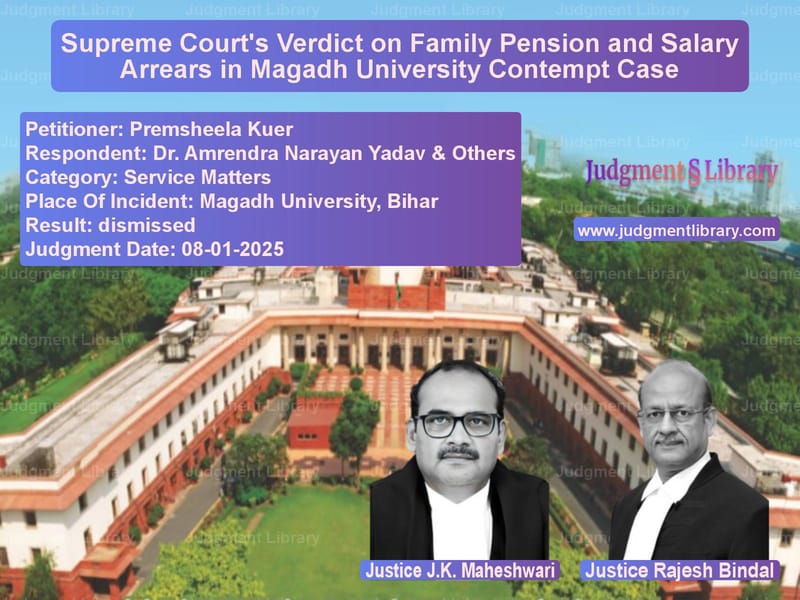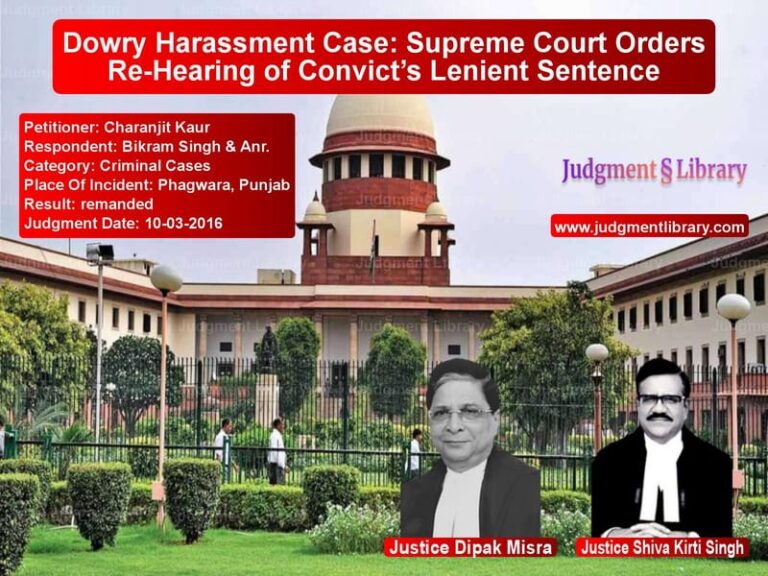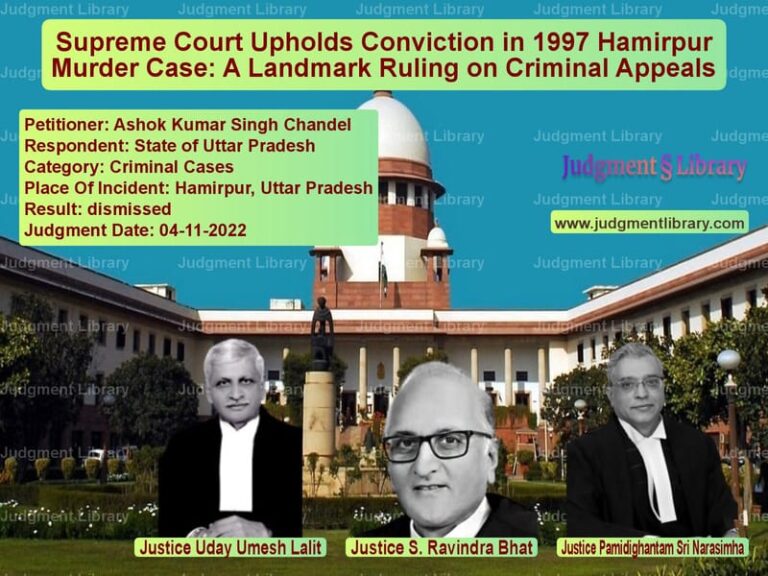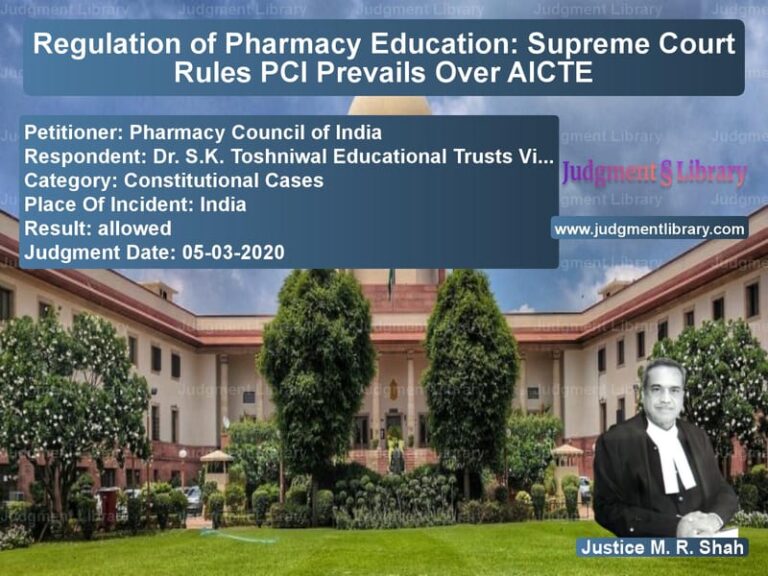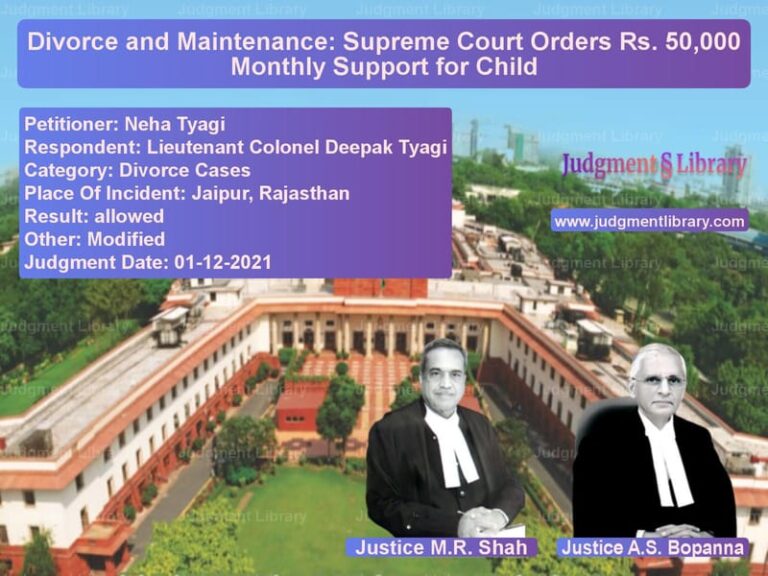Supreme Court’s Verdict on Family Pension and Salary Arrears in Magadh University Contempt Case
The Supreme Court of India recently delivered a critical judgment in a set of contempt petitions regarding the non-compliance of its previous ruling in Krishna Nand Yadav & Others v. Magadh University & Others. The case involved a dispute over the non-payment of salary arrears and family pension benefits following the absorption of university employees, a matter that had been previously adjudicated by the Court.
The petitioners alleged that despite a clear directive from the Supreme Court, the authorities failed to disburse the pending salary and pension benefits. The respondents, on the other hand, contended that some employees were not entitled to these benefits due to lack of actual service during the absorption period. This legal tussle brought to the forefront questions regarding compliance with judicial orders, procedural fairness, and the scope of contempt jurisdiction.
Background of the Case
The case stemmed from the absorption of employees into Magadh University, particularly in relation to the late Ayodhya Prasad, who was employed as a Lab In-charge at R.L.S.Y College. His claim for absorption had been recognized by the J. Sinha Commission, and the Supreme Court had approved it in its ruling dated 31.08.2017.
However, complications arose when B.R. Ambedkar University issued an absorption order on 18.09.2018 with effect from 13.05.2016. Given that Ayodhya Prasad had passed away on 09.02.2012, the University issued a corrigendum on 19.09.2018, adjusting the date of absorption to 12.02.1990. This adjustment ensured that the period from absorption to his death would be counted for retiral benefits.
Key Legal Issues
- Did the University commit contempt by failing to implement the Supreme Court’s directive?
- Can an employee be posthumously absorbed for the purpose of pension benefits?
- How should salary arrears and pension payments be determined?
Arguments of the Parties
Petitioners’ Arguments
The petitioners, represented by legal counsel, put forth the following arguments:
- The Supreme Court had already ruled in favor of absorption, and the authorities’ failure to comply constituted contempt.
- The corrigendum recognizing absorption from 12.02.1990 was legally valid and should be implemented without further delay.
- Since the late employee had been absorbed notionally, his family was entitled to all retirement benefits, including pension.
Respondents’ Arguments
The respondents, including university officials and representatives of the State of Bihar, countered with the following points:
- Contempt proceedings were not the appropriate forum to resolve factual disputes regarding employment records.
- The petitioners had not presented sufficient evidence to prove actual work during the absorption period.
- Salary arrears and pension claims should be examined under the existing verification process before disbursement.
Key Observations and Judgment
Supreme Court’s Findings
After evaluating the arguments, the Supreme Court observed:
“The period from the date of absorption till death would be counted as period spent on duty notionally for the purpose of retiral and other consequential benefits.”
However, the Court also noted that disputes regarding salary arrears required factual adjudication, which could not be addressed within contempt proceedings.
Final Judgment and Directions
The Supreme Court issued the following directives:
- Petitioners must submit their claims along with documentary proof to the Registrar/Vice Chancellor of the University.
- A thorough inquiry should be conducted to verify actual working status and entitlement to salary arrears.
- Family pension claims should be assessed separately, uninfluenced by past orders that restricted payments.
- All payments, if found valid, should be completed within two months from the final decision of the University.
- If any excess payments were made in the past, authorities were permitted to recover them as per due legal procedures.
- Any party dissatisfied with the Registrar’s decision could approach the High Court for further relief.
Impact of the Judgment
The ruling establishes a structured process for determining salary arrears and pension eligibility while maintaining procedural fairness. It also clarifies the limitations of contempt proceedings, ensuring they are not used as a substitute for fact-finding inquiries.
Conclusion
The Supreme Court’s judgment provides clarity on pension and salary entitlements for absorbed employees. It ensures compliance with judicial directives while maintaining procedural fairness and upholding the integrity of the contempt jurisdiction.
Petitioner Name: Premsheela Kuer.Respondent Name: Dr. Amrendra Narayan Yadav & Others.Judgment By: Justice J.K. Maheshwari, Justice Rajesh Bindal.Place Of Incident: Magadh University, Bihar.Judgment Date: 08-01-2025.
Don’t miss out on the full details! Download the complete judgment in PDF format below and gain valuable insights instantly!
Download Judgment: premsheela-kuer-vs-dr.-amrendra-narayan-supreme-court-of-india-judgment-dated-08-01-2025.pdf
Directly Download Judgment: Directly download this Judgment
See all petitions in Employment Disputes
See all petitions in Pension and Gratuity
See all petitions in Public Sector Employees
See all petitions in Judgment by J.K. Maheshwari
See all petitions in Judgment by Rajesh Bindal
See all petitions in dismissed
See all petitions in supreme court of India judgments January 2025
See all petitions in 2025 judgments
See all posts in Service Matters Category
See all allowed petitions in Service Matters Category
See all Dismissed petitions in Service Matters Category
See all partially allowed petitions in Service Matters Category

